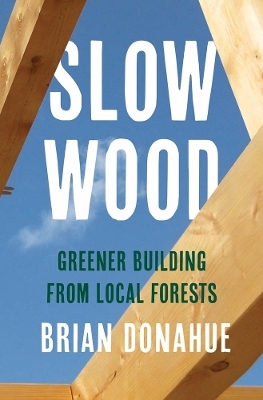
Slow Wood
Greener Building from Local Forests
Seiten
2025
Yale University Press (Verlag)
978-0-300-27347-2 (ISBN)
Yale University Press (Verlag)
978-0-300-27347-2 (ISBN)
- Lieferbar (Termin unbekannt)
- Versandkostenfrei innerhalb Deutschlands
- Auch auf Rechnung
- Verfügbarkeit in der Filiale vor Ort prüfen
- Artikel merken
A counterintuitive proposal for healing the relationship between humans and forests through responsible, sustainable use of local wood in home building
A radical proposal for healing the relationship between humans and forests through responsible, sustainable use of local and regional wood in home building
American homes are typically made of lumber and plywood delivered by a global system of ruthless extraction, or of concrete and steel, which are even worse for the planet. Wood is often the most sustainable material for building, but we need to protect diverse forests as much as we desperately need more houses.
Brian Donahue addresses this modern conundrum by documenting his experiences building a timber frame home from the wood growing on his family farm, practicing “worst first” forestry. Through the stories of the trees he used (sugar maple, black cherry, black birch, and hemlock), and some he didn’t (white pine and red oak), the book also explores the history of Americans’ relationship with their forests.
Donahue provides a new interpretation of the connection between American houses and local woodlands. He delves into how this bond was broken by the rise of a market economy of industrial resource extraction and addresses the challenge of restoring a more enduring relationship. Ultimately, this book provides a blueprint and a stewardship plan for how to live more responsibly with the woods, offering a sustainable approach to both forestry and building centered on tightly connected ecological and social values.
A radical proposal for healing the relationship between humans and forests through responsible, sustainable use of local and regional wood in home building
American homes are typically made of lumber and plywood delivered by a global system of ruthless extraction, or of concrete and steel, which are even worse for the planet. Wood is often the most sustainable material for building, but we need to protect diverse forests as much as we desperately need more houses.
Brian Donahue addresses this modern conundrum by documenting his experiences building a timber frame home from the wood growing on his family farm, practicing “worst first” forestry. Through the stories of the trees he used (sugar maple, black cherry, black birch, and hemlock), and some he didn’t (white pine and red oak), the book also explores the history of Americans’ relationship with their forests.
Donahue provides a new interpretation of the connection between American houses and local woodlands. He delves into how this bond was broken by the rise of a market economy of industrial resource extraction and addresses the challenge of restoring a more enduring relationship. Ultimately, this book provides a blueprint and a stewardship plan for how to live more responsibly with the woods, offering a sustainable approach to both forestry and building centered on tightly connected ecological and social values.
Brian Donahue is professor emeritus of American Environmental Studies at Brandeis University. He is a farmer, historian, and conservationist, and the author of prize-winning books about the past and future of New England farms and forests. He lives in Gill, MA.
| Erscheinungsdatum | 15.11.2024 |
|---|---|
| Zusatzinfo | 48 b-w illus. |
| Sprache | englisch |
| Maße | 156 x 235 mm |
| Themenwelt | Sachbuch/Ratgeber ► Freizeit / Hobby ► Heimwerken / Do it yourself |
| Sachbuch/Ratgeber ► Gesundheit / Leben / Psychologie | |
| Sachbuch/Ratgeber ► Natur / Technik ► Natur / Ökologie | |
| ISBN-10 | 0-300-27347-9 / 0300273479 |
| ISBN-13 | 978-0-300-27347-2 / 9780300273472 |
| Zustand | Neuware |
| Haben Sie eine Frage zum Produkt? |
Mehr entdecken
aus dem Bereich
aus dem Bereich
süße und praktische Tierfiguren aus Holzwürfeln
Buch | Hardcover (2024)
Frech (Verlag)
15,99 €


